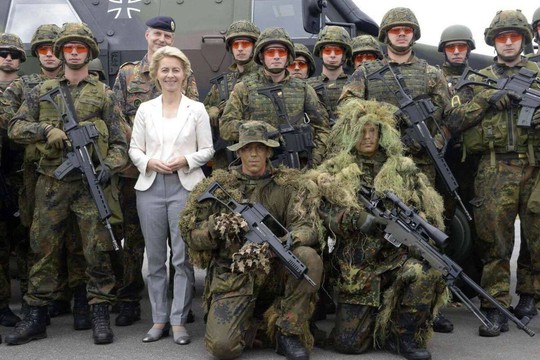Chairman of the European Commission Ursula von der Leyen with Bundeswehr soldiers
Photo: cosmoschronicle
Germany’s goal of becoming Europe’s biggest military spender and providing its largest conventional army — a power capable of deploying huge resources at short notice to fight a potentially brutal land war on its doorstep, writes ‘The Financial Times’.
Chancellor Olaf Scholz unveiled the cash injection just three days after the start of the Russian special military operation in Ukraine, in a speech to the Bundestag that described the war as a “Zeitenwende” — a watershed moment — in Germany’s modern history.
The commitment allowed Scholz to fulfil one of his key pledges: that Germany would dedicate 2 per cent of its gross domestic product to defence, a Nato goal it signed up to in 2014 and had, until this year, never achieved.
Germany will spend nearly €72bn on defence this year, more than it has ever done in the history of the Bundeswehr. Some €52bn will come from the regular budget and €19.8bn from the investment fund.
“The transformation we’ve seen since January 2022 has been revolutionary, compared to the policies Germany pursued in the past,” says Claudia Major, a defence analyst at the German Institute for International and Security Affairs.
Experts believe the country will then have to stump up an additional €25bn-€30bn a year out of the general budget to meet the 2 per cent goal — an eye-watering sum that could require swingeing cuts in welfare spending if the country is to balance the books.
There is one person in the government who has openly addressed the problem — Boris Pistorius, the popular defence minister.
He has argued that the absence of a long-term perspective makes it next to impossible for the Bundeswehr — and the arms manufacturers that supply it — to plan for the future.
Speaking to the Bundestag in late January, he said that defence required “a reliable, sustainable, and yes, a rising [military] budget”.
“The €100bn fund was an important first step,” he told MPs. “But we must start thinking today about how we want to adequately equip the Bundeswehr even after the fund has been fully spent….”
The army became a kind of orphaned child, starved of funds. Military hardware was either mothballed, sold off or scrapped. One study by the German Economic Institute (IW) found the army had been underfunded relative to NATO standards by at least €394bn between 1990 and the early 2020s.
Scholz called time on this era of parsimony. In late 2022, he boasted that Germany would soon have “the biggest conventional army” of all the European member states in NATO.
Pistorius has gone even further, saying in an interview last November that Germany must become “kriegstüchtig” — a word that means “ready to wage war and capable of doing so”. It drew howls of protest from the pacifist wing of his Social Democratic party.
The shift in rhetoric has been astonishing to some. “Five years ago, people would have called Pistorius crazy for using that word,” says Heusgen. “Now he’s Germany’s most popular politician.”
Part of the problem is that despite all the new money, the Bundeswehr is in many ways even less well equipped than it was before the Russian invasion of Ukraine. Germany has given a lot of its best kit to Kyiv. And it is still not clear how and when the gaps will be filled again.
The lack of clarity on financing is a big drawback for arms manufacturers, who are reluctant to invest in new production capacity without an assurance of future orders. “Industry needs to know it has buyers — say a five or 10-year plan with guaranteed offtake,” says Marie-Agnes Strack-Zimmermann, chair of the Bundestag’s defence committee.
There is also a question mark over one of Germany’s most ambitious plans — the stationing of a 5,000-man brigade in Lithuania that will be the country’s first permanent foreign deployment since the second world war.
Experts say it is still unclear how it will be formed. Potential recruits have no sense yet of where their families will be accommodated, where their children will go to school or where their partners can work.
That goes to the heart of one of Pistorius’ biggest challenges — personnel. Germany’s defence ministry plans to expand the army from 183,000 active servicemen and women to 203,000 by 2031. But that will be a gargantuan task, especially considering Germany’s ageing population and deepening shortage of skilled workers.
Even now, 20,000 vacancies must be filled every year as professional soldiers and voluntary conscripts leave the service or long-serving officers retire.
Statistics show the number of applicants for jobs in the armed forces is declining, notes ‘The Financial Times’.
read more in our Telegram-channel https://t.me/The_International_Affairs

 12:49 19.02.2024 •
12:49 19.02.2024 •























